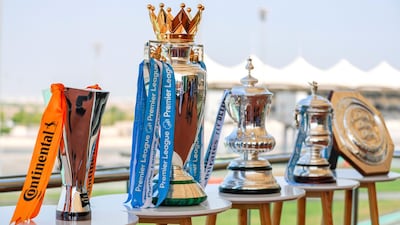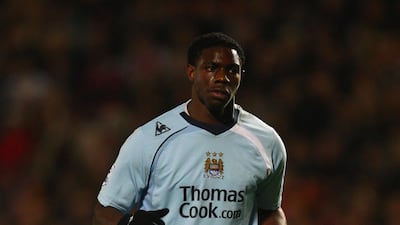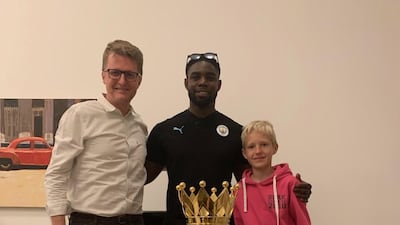Micah Richards remembers the blend of surprise and scepticism.
Like most others, he was in the dark when news emerged that Manchester City had prospective buyers. It was 2008 and a second takeover in as many summers after life under Thaksin Shinawatra had promised more than it delivered.
“I didn’t actually know what was going on,” said Richards as he harked back to Abu Dhabi United Group’s (ADUG) buyout.
“We had Shinawatra just a year before, and because that ended sourly or badly, we didn’t know if this was going to be real. How many times have you heard of clubs being taken over and it actually never goes through? We were thinking: ‘Here we go again'."
When it transpired there was more substance to the new owners, Richards recognised everything was changing.
As he reflected on the transformation of City, he highlighted the role of three controversial figures whose arrivals were signs of ambition. Robinho, Carlos Tevez and Roberto Mancini accelerated City’s transition from mid-table team to serial trophy winners.
Richards was the only remnant of the side of 2006/07, who infamously failed to score a home league goal after New Year’s Day, to remain a regular in the title winning campaign five years later. When the takeover came, he realised the bar had to be raised.
“When it actually happened, we thought ‘wow’ but at the same time, we knew our places are going to be up for grabs now,” he said.
“You are thinking, we want to know more about the owners, where they are from and where they see the project going. I was one of the young prospects then but I was the biggest asset so any time we got this kind of news, I’d be the one told.
"When it went through, I thought: ‘This is amazing, the goal is not just staying in the Premier League now but one day winning the Premier League’. You think that in your head and you don’t think that will actually happen.” Four years later, it did.
Robinho was the first flagship signing, plucked from under Chelsea’s noses in 2008.

Richards was watching it happen on television. “It was weird really because some people said Robinho was coming and I remember him being on Sky Sports News and seeing him coming through the airport with his hat on backwards,” he said.
“I thought: ‘This is not real, how have we managed to get Robinho?’ It was incredible. I knew from that moment. He was the catalyst for where Manchester City went because in every club to go and do whatever they are going to do, they need one marquee player who is going to set the bar, then other players want to come.”
The Brazilian joined from Real Madrid and scored 15 goals in his debut season, though he was only to get one more before heading off to Santos and AC Milan.
It was a hybrid City side, with a galactico bolted on alongside some more mediocre personnel. They spent his first Christmas in the relegation zone. Richards feels he was the right player to raise the profile but wonders what happened if he had joined a team with similar talents.
“I felt a bit sorry for Robinho because had he come two or three years later, he could have had some of his best years at Manchester City but because he was Robinho, everyone relied on him so much to do absolutely everything,” he explained.
“If he didn’t beat five players and score every single game, everyone would say that he’s not that good. It was more the players around him who didn’t give him what he needed for them to go and flourish and be the best they could be.”
Tevez was the second superstar signing, lured across Manchester in 2009. He scored 29 goals in his debut campaign, becoming City’s player of the year, and captained their first trophy-winning side in 35 years when they secured the 2011 FA Cup.
“When he came from Manchester United, he was the best player in that team by far,” Richards remembered.
“He just carried us on his shoulders for years. When Tevez came, he had pace, strength, technique and goalscoring ability. He believed in his ability, he knew how good he was but he didn’t care about the plaudits. He was just doing it for himself.”
The Argentine’s four-year stay at the Etihad Stadium was eventful. He went six months without an appearance in the 2011/12 season after Mancini accused him of refusing to warm up in the Champions League defeat to Bayern Munich, but he was pivotal in the run-in on his return.
“He came back against Norwich and scored a hat-trick,” Richards recalled. “If he didn’t come back at that time, we wouldn’t have won the league. There were so many pieces to that jigsaw that happened that made us click.”
He felt it gave City a quartet of attackers comparable with a famous four at United a few years earlier.
“Him and Sergio Aguero and Mario Balotelli and Edin Dzeko, you are not getting a better four strikers than that,” Richards said. “When United had Tevez, Wayne Rooney, Dimitar Berbatov and Cristiano Ronaldo, that was a top four.”
Tevez was not alone in falling out with Mancini. Yet the Italian’s single-mindedness was crucial, Richards feels, in altering the mentality of a club unaccustomed to winning anything.
“Mark Hughes was a good manager and he stabilised us but I think the difference between Mark Hughes and Mancini was that Mark Hughes was a nice guy,” Richards said. “He tried to keep everybody happy. Mancini came in and he didn’t care if you were the best player in the team: it was his way or no way.”
Mancini had a capacity to alienate which perhaps made it inevitable that there was a time limit on his stay. An obsessive also had the ability to improve players, as Richards can testify.
“You will probably hear various reports that lots of people didn’t get on with Mancini, which is correct,” the defender said.
“They didn’t but Mancini was doing what he thought was right for the team and there was not going to be any ego. He was going to be the boss. He came in December [2009] and Christmas is a busy schedule for anyone.”
Mancini made it busier. “We were coming back for double sessions under floodlights, which had never been done in the history of my career.
"You had double sessions in pre-season because it was still light and that is when you want to get as fit as you possibly can but we were coming back at 6 o’clock at night doing fitness and tactical work. If you were out of line by a centimetre, you would have to start the whole session again. He was just a perfectionist.”
The message was that if City’s players wanted to win anything, they had to listen to Mancini.
Under him, they won the FA Cup and a first league title in 44 years. He could be divisive but Richards feels the current Italy manager had a huge impact, adding: “If you hated him or loved him, he was an incredible coach.”








